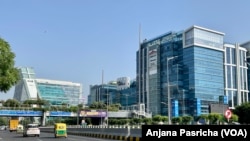Despite improving living standards in India as the economy grows briskly, more than half a billion people struggled to afford food in the past year, while the numbers of those finding it difficult to get by have nearly tripled since 2016, according to a Gallup survey released Tuesday.
That contrasting picture is highlighted in the poll, "Indians See Brighter Economic Future but Feel the Pinch Now."
In the world's fastest-growing economy, optimism was higher when compared to other major economies like the United States, Japan or Germany.
"For me, the key takeaway of this poll is that there is a lot to be hopeful for with regards to India's economy, but significant challenges remain," Benedict Vigers, author of a three-part Gallup series on India, told VOA. "Just because a nation can be optimistic about the trajectory of their economy in the future, doesn't mean lots of people can't be finding things hard today," he pointed out.
The survey found that 57% of Indians said their living standards were getting better but the situation remains bleak for hundreds of millions.
India's mega cities reflect that dichotomy. In Gurugram, a thriving business hub adjacent to New Delhi, gleaming new office buildings and plush high-rise apartments cater to domestic and global companies and an expanding middle class.
But tucked behind the city's glitzy façade lie crowded shanties where tens of thousands of migrant workers who work in the city cram into tiny tenements.
They drive cabs and auto rickshaws, work as drivers, security guards, laborers, carpenters and cooks and waiters in restaurants and hotels or as household help in upmarket residential complexes.
Among them is Durga Gautam, who trudges daily from her single room to a posh residential complex to work as a household helper – her monthly wages add up to about $150. "I have to support two daughters and two grandchildren. Everything has become so expensive – a 25-kilogram bag of rice which used to cost about $10 dollars now costs more than $12.5. My salary has not gone up much, so I have to keep tightening my budget."
In India's vast rural areas, many farmers own small plots of land that generate only meager incomes.
More than two in five people (43%) in 2022 said they had struggled to afford food at times in the past 12 months, according to the Gallup survey. Affording shelter at times posed a challenge for about one-third of the country.
The poll also found that the proportion of Indians who are finding it "very difficult" on their present household incomes reached 31% during the past two years, up from 12% in 2016.
Although India's economy is faring well, it has not been immune to the high inflation that has impacted many countries in recent years. Food prices, which are a particularly sensitive issue in a country with a per capita income of about $2,100, jumped by over 11% in July.
Economists say that for many people, inflation is part of a double whammy — the country is also grappling with high unemployment.
It is not only joblessness though, according to economist Arun Kumar, who pointed out there is also a high level of underemployment in a country where the bulk of the workforce is self-employed.
"320 million Indians have some kind of work, but for many of them it may be only for a few hours a day or week. So in a country of 1.4 billion people, each worker has to support four people," Kumar said.
Despite these challenges, perceptions about economic prospects are improving according to the survey.
Anshi Madhwar, who has been working as a management consultant for about four years is optimistic about her career. "Things have improved in recent years and there are good prospects, good opportunities to grow ahead for me," she said.
Experts attribute that to the economic upturn India has witnessed for most of the past two decades. That growth is expected to continue in the coming years.
The survey, however, said sharing the fruits of this growth among its 1.4 billion people will be key if India is to live up to its economic potential.
"There is still a large proportion of Indian society who are yet to fully reap the benefits of India's impressive economic growth," according to Vigers. "If India is to make the most of its economic growth in coming years, spreading the benefits to those unable to afford basic needs will be key."
But more equitable distribution of income remains a challenge. Some low-income workers say they have only seen the gap widen in recent years. "The cars on the road are bigger and more expensive compared to ten years ago," says Satinder Singh, a driver. "But my living standards have not improved, only the rich are getting richer."







